‘It’s only weird if it doesn’t work’: Zag fans are not alone in their superstitious behavior headed into Sweet 16
KHQ news anchor Stephanie Vigil wears a red, white and blue plaid jacket while covering the NCAA men’s basketball tournament in 2021. Vigil said she now has a pair of pants to match the jacket, but will only wear them together if the Bulldogs can return to the national championship game. (Courtesy Stephanie Vigil)
The scoreboard read Tigers 41, Bulldogs 31, and Gonzaga alumnus Sean McKenzie had a dilemma on his hands.
“We were sitting there watching the game, my wife and I, and it was rough at halftime,” said McKenzie, class of ’98 and president of the local chapter of the alumni association. He was at Black Label Brewing downtown, watching the potential round of 32 stunner on Saturday at a watch party with other members of the group. “We said, ‘Why don’t we watch the rest of it at home? I feel like they play better when we’re at home.’”
The overall No. 1 seed came storming back in the second half while the McKenzies watched on their own TV, confirming for McKenzie, of course, the completely irrational connection between his physical location in the universe and the performance of his favorite team.
“It’s like that saying, right?” he said. “It’s only weird if it doesn’t work.”
That refrain, popularized in a Budweiser beer campaign about a decade ago, was repeated by several Gonzaga fans in the run-up to Thursday’s contest against Arkansas in the Sweet 16. It’s also the perspective of Rick Grieve, a professor of psychology at Western Kentucky University who was part of a team of researchers performing perhaps the definitive look at the intersection of sports fanaticism and superstition published in 2013.
“There are a lot of studies that look at superstitions of athletes,” Grieve said in an interview Wednesday, “but very few that looked at the superstitions of the sports fans themselves.”
In that study, based on interviews of 1,661 college students over a period of several years, participants were asked to list in detail their superstitious behavior and what effect they thought those behaviors had on the performance of their favorite team. Lucky seats or locations, like the one described by McKenzie, were common.
Jarrod Judd, a Spokane native and self-described lifelong fan of the Zags, saw it firsthand on Saturday, too, while watching the game with his family at their home.
“The first half wasn’t amazing,” he said. “We were all watching downstairs, and my mom ended up watching the second half upstairs.
“So, obviously, it worked,” Judd said, chuckling.
Grieve’s research looked at fans of all sports, and included several distinctive behaviors tied to those sports. One particularly candid follower of the now-defunct Houston Aeros minor league hockey team admitted that he put his socks in the freezer for two hours before attending a game.
“This is what they do to the game pucks,” the fan wrote as justification. “I feel it gives us a slight advantage.”
It’s that feeling of an advantage, of improving a team’s odds against an anxiety-producing defeat, that could be the explanation of such irrational behavior, Grieve said.
“The crazy behaviors people do are reinforced through what we call negative reinforcement,” Grieve said. “We don’t like feeling anxious, so we do things to manage that behavior.
“When my behavior coincides with something that happened on the court that decreases my anxiety, I think, ‘Of course it works,’” he continued.
Perhaps because they’re in control of the action on the floor, this Gonzaga team didn’t talk much about their own superstitions when speaking with reporters in San Francisco on Wednesday.
“I don’t think I’ve heard of any superstitious activities from any of our teammates, like anything like that, but we have like a game-day routine within the team, whether it’s shoot-around, when team meals are, stuff like that,” freshman center Chet Holmgren said. “Outside of that, I just try to put my preparation in and live by that instead of living by superstitious stuff.”
“I would say the only thing is play your ass off,” junior forward Drew Timme said, to laughter. “So if that’s a superstition, there’s one for you.”
Apparel routines were among the most common reported superstitions Grieve’s team found, which makes sense to Gonzaga graduate, former announcer and actor Eric Edelstein. During big games, Edelstein said, he has to pull out a game jersey, No. 33, given to him after a game by former baseball coach Steve Hertz.
“I’ll be honest, that jersey is a little tight now,” Edelstein, a 2000 alumnus, said. “I still have to wear it for the big games.”
But Edelstein said Wednesday he was in the process of having the numbers changed on a different jersey he wore to the championship game last year that the Bulldogs dropped to Baylor.
“I will not wear that clothing again,” he said.
KHQ-TV anchor Stephanie Vigil wore a red, white and blue jacket to last year’s Final Four contests and plans to pair that jacket with pants if, and only if, the Bulldogs reach the national championship in New Orleans.
“I just don’t want to put it all together until they put it all together,” Vigil said.
The study found that, of all sports the participants said they were fans of, college basketball enthusiasts reported the most superstitions. That may not be a coincidence, Grieve said, but rather the nature of the monthlong, single-elimination tournament that determines the national champion.
“What I do know is that as the games become more important, the anxiety does increase,” he said. “That can lead to an increase of doing things that are superstitious.”
Edelstein said he has to FaceTime with former Gonzaga guard Kevin Williams, class of ’97, before each game, a ritual he calls “tapping in.”
“We talk out the game plan, and what Gonzaga is going to do to win,” Edelstein said. Such a ritual is reserved for tournament games and other “big” early season games, he said.
While Vigil, a recipient of a master’s degree from Gonzaga University in 2013, has already planned her outfit for the Final Four, she said she didn’t consider wearing that clothing during the regular season, when the stakes are lower.
“Why do I believe that what I wear will determine the outcome of the game?” she asked rhetorically. “That’s ridiculous.”
Even those who study the phenomenon aren’t immune to its effects. Grieve, who was born in Michigan, said he roots for all teams from that state during the tournament. That included pulling for the Spartans to pull off the round of 32 upset against Duke last weekend.
He turned the game on, and Michigan State was in the lead late. But they quickly relinquished the advantage and lost.
“I thought maybe it was me,” Grieve said, laughing.
Some Zags fans even believe what the team wears affects the outcome of the game. Following the 2017 national championship loss to North Carolina, there were calls for the team to burn to ash their black alternate jerseys, believing them to be unlucky.
Gonzaga is 5-0 when wearing their black alternate jerseys this year, most recently an 89-73 victory over San Francisco on Feb. 24. They also bested UCLA in their black jerseys in November to win the Empire Classic held in Las Vegas. The Zags wore their white jerseys with navy trim in last season’s loss to Baylor in the national championship game.
Edelstein, for all his concern about his own outfit, said he didn’t subscribe to the theory of the black jersey jinx, though he has refused to watch any games with a friend with whom he watched the Zags and Adam Morrison fall to UCLA by two points in the 2006 Sweet 16.
“I love my buddy Ben, but I can’t watch a Gonzaga game with him,” Edelstein said. “There’s too many Gonzaga jinxes out there.”
Brian Steverson, professor and chair of business ethics at Gonzaga, immediately scoffed at the idea of the Bulldogs donning their black jerseys in March.
“The black jerseys are no good,” Steverson said. “The whole campus let out a collective groan when we saw them come out in those jerseys (five years ago).”
Perhaps it’s unsurprising Steverson would react that way. He and several fellow professors have a ritual for watching tournament games and other marquee matchups during the regular season that he likens to a pilot’s checklist before takeoff: sitting on a hassock, in the home of the chair of the philosophy department, munching on peanut M&M’s after rubbing the belly of a Gonzaga gnome statue that belonged to his wife’s uncle, RV, who died and bequeathed the statue to the group.
“The line between ritual and superstition is a really, really thin line,” Steverson said. He believes the group continues to meet, and sit in their same places, in an effort not only to make themselves feel more at ease about the outcome but also as a sense of community with the team and campus.
There are, of course, rules.
After the first half of the first-round game of this year’s tournament, the party noticed the beads missing from around the gnome’s neck as Gonzaga clung to just a two-point lead over Georgia State. They were returned for the second half, and after a rough start, the Bulldogs cruised to a 21-point victory.
“We won’t make that mistake again,” Steverson said.
McKenzie, the alumni association president, will be back at Black Label Brewing for Thursday’s matchup with Arkansas. His wife, however, has a work function and will be watching from the relative security of their home.
“This tournament’s already been bonkers,” he said. “We need to tell people to do it, whatever their Gonzaga ritual is. Do it.”
Staff writer Colton Clark contributed to this story.



